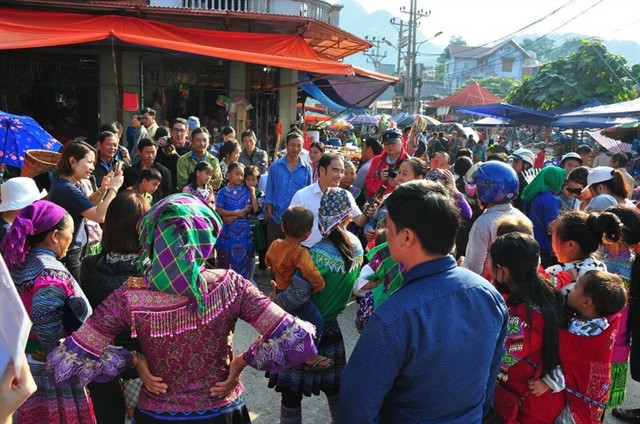 Staff from the northern province of Lao Cai’s Department of Labour, Invalids and Social Affairs launch a dissemination campaign to raise awareness on human trafficking for local people. (Photo plo.vn)
Staff from the northern province of Lao Cai’s Department of Labour, Invalids and Social Affairs launch a dissemination campaign to raise awareness on human trafficking for local people. (Photo plo.vn)Hanoi (VNA) - As many as 3,476 Vietnamesepeople have become victims of trafficking since 2013, with over 90 percent ofthem women and children.
The information was revealed by NguyenXuan Lap, head of the SocialEvils Prevention Department under the Ministry of Labour, Invalids and SocialAffairs, at a conference held in Ho Chi Minh City on November 29.
The event aimed at reviewing the implementation of aGovernment decree guiding the implementation ofsome articles of the Law on Human Trafficking Prevention and Combat (Decree 09/2013/ND-CP).
Statistics from the United Nations Office on Drugs andCrime showed that there have been around 244 million international migrants inthe world, and the number of migrants was increasing due to terrorism, conflictand violence. Many of them have become trafficking victims.
“The Mekong sub-region, including Vietnam, isconsidered a hot spot for human trafficking and illegal migration, with profitsfrom trafficking activities estimated at up to dozens of billions of dollars ayear,” said Le Van Nhan,deputy head of the Anti-Human Trafficking Office under the Ministry of PublicSecurity’s Criminal Police Department.
Most of the trafficking victims live in rural areasand face financial difficulties. They are not well-educated and are eitherunemployed or involved in agriculture.
Traffickers often took advantage of the financialsituations of victims as well as their poor education, he said.
Some foreigners worked with Vietnamese people who actas middlemen to bring labourers to work abroad illegally. While they areabroad, the identity documents of the labourers were seized so they would beforced to work or have their wages withheld.
The Government has taken many measuresto support victims of trafficking.
From 2013 to June this year, 2,960 victims had receivedassistance from the State and social organisations in the forms of medical,psychological, legal and cultural support as well as vocational training.
However, many participants at the conference said some sectors and localauthorities have failed to pay due attention to human trafficking prevention and combat, as well as support for victims afterthey are rescued in some localities.
They proposed that there should be clear regulationsrelating to the verification of trafficking victims and care for them.
Close coordination between agencies in receiving victims back andproviding support for them is needed.
It is necessary to havestaff with professional skills to help the victims stabilise their lives assoon as possible, said the participants./.




























